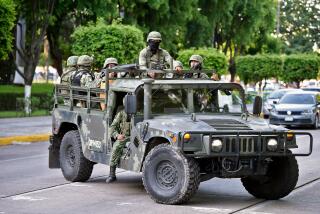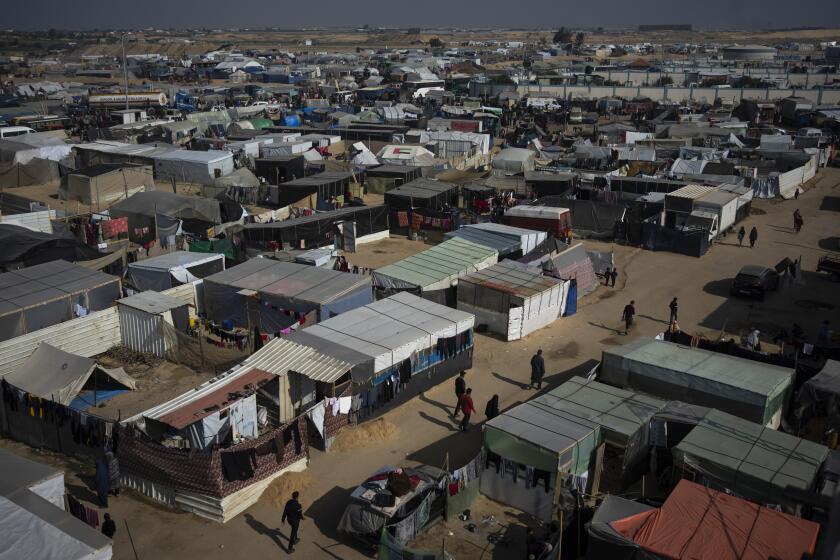Nakasone Fires Aide for Remarks on China, Korea
Prime Minister Yasuhiro Nakasone dismissed Minister of Education Masayuki Fujio on Monday after China and South Korea filed formal protests over remarks by Fujio that appeared to minimize Japanese aggression against its neighbors.
The education minister had said that Korea accepted colonization by Japan in 1910 and that the slaughter of tens of thousands of Chinese civilians by Japanese troops in 1937 was just a “part of war.”
He also expressed the view that the so-called rape of Nanking paled by comparison with the U.S. atomic bombing of Hiroshima and Nagasaki.
South Korea, in addition to filing an official diplomatic protest, asked for postponement of a meeting of the two countries’ foreign ministers scheduled for Wednesday and Thursday.
The chief secretary of the Japanese Cabinet, Masaharu Gotoda, described Fujio’s statements as “extremely deplorable.” He said they “cast needless doubt upon our country’s basic policy of seeking to maintain and strengthen friendly relations with our neighboring countries.”
South Korean diplomats said the statements were “the most serious incident in Korea-Japan relations” since full diplomatic ties were established between Seoul and Tokyo in 1965.
The statements leading to Fujio’s dismissal were made in an interview with the monthly magazine Bungei Shunju, appearing in an issue that will go on sale Wednesday. It was the third time since he was named to the Cabinet on July 22 that Fujio had criticized China and Korea for complaining about references, in a Japanese textbook approved by the Education Ministry, to Japan’s aggression against the two countries.
Seoul and Peking both filed protests on the first occasion, on July 25, but said nothing when he spoke out again on Aug. 12. After Fujio’s comments to Bungei Shunju were made public Saturday, the New China News Agency criticized the education minister, but only Seoul filed an official protest.
‘Extremely Regrettable’
Nakasone’s decision to dismiss Fujio came just 12 days before the prime minister is scheduled to visit South Korea in connection with the opening there of the Asian Games. On Saturday, Nakasone said that Fujio’s interview comments were “extremely regrettable” in light of efforts he said he has made to improve relations with South Korea and China.
In Seoul on Monday, Foreign Minister Choi Kwang Soo called in the Japanese ambassador, Kiyoshisa Mikanagi, and proposed a postponement of his scheduled consultation with the Japanese foreign minister, Tadashi Kuranari.
Choi said that Fujio’s remarks “constitute a crucial and serious problem touching the core of bilateral relations” with Japan. The comments, he added, “seriously aggravated the emotions of the Korean people.” Choi demanded that Japan take “convincing measures” to deal with the situation.
Unanswered Appeal
Mikanagi appealed to Choi not to postpone the meeting, but Choi did not reply. Nor did he make any reference to Nakasone’s scheduled visit to Seoul Sept. 20-21.
Communist North Korea, with which Japan maintains no diplomatic relations, also condemned Fujio’s remarks, according to a Radio Pyongyang broadcast Monday.
Fujio told reporters that he had insisted on being dismissed. To resign, he said, would be to admit that his statements were incorrect or improper.
He said he told Nakasone at a special meeting of the Cabinet and executives of the Liberal Democratic Party that “for me to quit would amount to me withdrawing my views, my way of thinking,” and “no matter what happens, I will not do that.”
“My statements represent my firm conviction,” he said. “The best way for the Nakasone government to show its decision on this issue to the Korean government is to fire me.”
3rd in 33 Years
Although the Cabinet and party executives agreed that Fujio would have to leave, Nakasone waited to dismiss him until meeting with him personally Monday evening. It was only the third time since World War II, and the first in 33 years, that a Cabinet minister has been fired.
Fujio, one of the chief supporters of Shintaro Abe, a leading candidate to succeed Nakasone, had resigned earlier from Abe’s faction of the party to “avoid causing an inconvenience” to Abe.
To succeed Fujio, Nakasone named Masajuro Shiokawa, another member of the Abe faction. And he ordered the Foreign Ministry to explain Fujio’s dismissal to Korean and Chinese diplomats.
In the Bungei Shunju interview, Fujio said the 1910 treaty that incorporated Korea as Japanese territory was signed by representatives of both governments, and thus “the Korean side bears responsibility to some degree.”
He said that if Japan had not taken control of Korea, Russia would have seized the country.
Nanking’s Capture
Fujio said that “the real truth” has yet to be determined about the rape of Nanking, when tens of thousands of civilians were killed by Japanese troops after they captured the Chinese city in December, 1937.
“Some people say 300,000 people were killed,” he said. “Others say 200,000. Still others say 100,000, or 20,000, or several thousand, or 1,500. In addition to the extreme lack of clarity about the facts of this incident, compared with the Opium War, aggression against India, the Spanish-American war, aggression against Africa, and the present Soviet invasion of Afghanistan, the scope of this (Nanking) incident is hardly worth writing about.”
Fujio blamed the Tokyo International War Crimes Tribunal set up after World War II for implanting in the minds of Japanese a feeling that they were guilty of aggression. And he condemned the war crimes trials as the “revenge of Western nations against the ‘yellow peril.’ ”
“War itself is killing people,” he said. “Attempts to emphasize how many tens of thousands of people were killed as a means to emphasize the severity of aggression are logically inappropriate.”
Law Violation Seen
Fujio acknowledged that international law prohibits the indiscriminate killing of civilians, but he said that the atomic bombs the United States dropped on Hiroshima and Nagasaki in 1945 constituted “a larger scale, a more intentional, and a clearer” violation of international law than Japanese troops’ actions in Nanking.
He said the orders issued in Nanking were given by the local commander and did not constitute national policy, while President Harry S. Truman gave the orders to bomb Nagasaki and Hiroshima.
More to Read
Sign up for Essential California
The most important California stories and recommendations in your inbox every morning.
You may occasionally receive promotional content from the Los Angeles Times.






